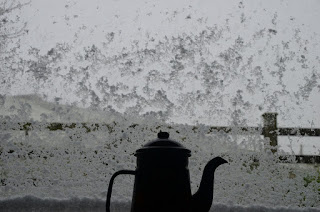 |
| Wintry conditions |
Even on our 29-foot boat (very small, by offshore standards) we always had enough stores aboard for at least one month; in the cottage we generally have enough for three months. But food isn't the whole story, you should also be prepared for power cuts, gas shortage or disrupted water supplies and be able to stay warm, keep hydrated and prepare the food you have in the house.
Useful gear to have
 |
| Rainwater barrel: a good source of water, once you've broken through the ice! |
Alternative lighting: Solar lanterns, candles, paraffin lamps (and paraffin to run them)
For keeping warm: Hot water bottles, thermos flasks, electric blankets, woollen blankets, long johns, woollen jumpers, onesies. Unless you live in a super well-insulated house, heat yourself rather than your rooms! Keep moving about at regular intervals.
For water storage: Plastic canisters with pouring spouts, collapsible water tanks, rainwater collection system from your roof (great additional source of water for washing and doing the dishes).
Bad weather doesn't come out of nowhere. It's usually forecast several days in advance. Time enough to make preparations. As we learnt at sea, do things while conditions are good, don't wait until it's suddenly too late.
What to do ahead of time
 |
| Paraffin lamp in the water pump housing |
- Get plenty of wood in (or whatever your alternative fuel is).
- Fill up water stores with tap water, no need to buy bottled water. Fill as many containers as you can, enough for a few days at least. If you haven't got access to water outside (like a stream or rainwater barrels), fill your bathtub with water for washing and the dishes.
- Look out your alternative lighting and put it somewhere you can find it in the dark.
- Top up any food supplies that are low.
- Cook a big pot of soup.
- Generally batten down the hatches, e.g. make sure nothing loose is left lying around outside, protect vulnerable plants, harvest available veg etc. One example lesson we learnt during the 'Beast from the East' is: insulate or heat the water pump housing when freezing temperatures are forecast!
- Cancel or rearrange any appointments scheduled during the time of the storm.
Food staples
 |
| There's always a silver lining! |
Stock up on:
- Grains and cereals such as porridge oats/oatmeal, wheat, rye, pearl barley, rice, quinoa
- Dried legumes such as beans, split peas, lentils and chickpeas (apart from split lentils, you'll need to soak these for at least eight hours, but then you can make soups, stews, curries, sandwich spreads etc. with them)
- Tea, coffee, sugar, salt, milk powder, herbs and spices, dried fruit and nuts
- Baking supplies: baking soda/powder, yeast or sourdough, flour
- Oil and vinegar
- Tinned food: tomatoes, mushrooms, fish, any other vegetables that you're particularly fond of
- Alcohol (especially medicinal spirits!)
- Hard cheeses (should keep for a few months)
- Potatoes and onions
- Eggs (best to keep hens, if you can!)
Useful stuff to have in the freezer: meat, fish, berries, butter, bread, leftover meals.
Above all, be flexible in what you eat, it may differ from your usual fare. Cooking and baking are highly desirable life skills, essential in certain situations, and everybody ought to know how to prepare basic foodstuffs, like baking a loaf of bread and making soup from scratch.
One thing that is often forgotten about is to make sure to have some entertainment at the ready that doesn't rely on power: card games, board games, physical books, that sort of thing. Once all is prepared and snug, there is no reason not to enjoy the enforced period of rest. As long as your home itself is intact, you can sit tight as the absurdly fragile structure of civilisation crumbles outside and wait in reasonable comfort for things to return to normal.
No comments:
Post a Comment
Comments and questions are welcome.
If you've tried something after reading about it here, or have suggestions, please tell us about it!